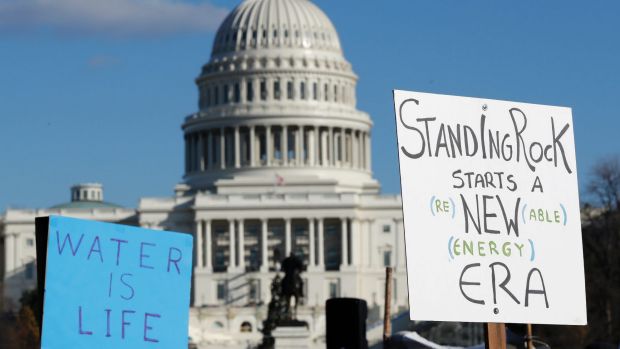Washington: President Donald Trump signed executive orders on Tuesday clearing the way for the controversial Dakota Access and Keystone XL oil pipelines to move forward. He also signed an executive order to expedite environmental reviews of other infrastructure projects, lamenting the existing "incredibly cumbersome, long, horrible permitting process."
"The regulatory process in this country has become a tangled up mess," he said.

It remained unclear how President Trump's order would restart the pipeline projects or expedite environmental reviews. Many of those reviews are statutory and the legislation that created them cannot be swept aside by an executive order. The White House did not immediately release texts of the orders.
Mr Trump said that both pipeline projects would be subject to renegotiation. In an Oval Office signing before reporters, the president said he would want any new projects to make use of American steel.
"I am very insistent that if we're going to build pipelines in the United States, the pipe should be made in the United States," he said.
The orders will have an immediate impact in North Dakota, where the pipeline company Energy Transfer Partners wants to complete the final 335 metre piece of the 1886-kilometre pipeline route that runs under Lake Oahe. The pipeline would carry oil from the booming shale oil reserves in North Dakota to refineries and pipeline networks in Illinois.
The Standing Rock Sioux tribe and other Native American groups have been protesting the project, which they say would imperil their water supplies and disturb sacred burial and archaeological sites. The Army Corp of Engineers called a halt to the project in December to consider alternative routes.
The executive order from Mr Trump on the Keystone XL pipeline threatens to undo a major decision by President Barack Obama, who said that the project would contribute to climate change because it would carry tar sands crude which is especially greenhouse gas intensive because of the energy it takes to extract the thick crude.

TransCanada, the Calgary-based project owner, has said it would be interested in reviving the pipeline. But it was unclear what Mr Trump's caution about renegotiation would mean for TransCanada's plans. Originally, TransCanada had planned to get about 65 per cent of the steel pipe from US manufacturers but other supplies from Canada.
On Tuesday, Mr Trump said: "From now on we're going to be making pipeline in the United States. We build the pipelines, we want to build the pipe. We're going to put a lot of workers, a lot of skilled workers, back to work. We will build our own pipeline, we will build our own pipes, like we used to in the old days."
Speaking to reporters on Monday, White House press secretary Sean Spicer said the president supported energy projects "like Dakota and the Keystone Pipeline, areas that we can increase jobs, increase economic growth, and tap into America's energy supply more, that's something that he has been very clear about."
Referring to comments Mr Trump has made during the campaign and after the election, "He was talking about that being a big priority. That's one of those ones where I think that the energy sector and our natural resources are an area where I think the president is very, very keen on making sure that we maximise our use of natural resources to America's benefit."
"It's good for economic growth, it's good for jobs, and it's good for American energy," Mr Spicer added.
As news of the move surfaced on Tuesday morning, oil industry officials hailed it as overdue.
"Making American energy great again starts with infrastructure projects like these that move resources safely and efficiently," said Stephen Brown, vice president of federal government affairs at Tesoro Companies.
"We are pleased to see the new direction being taken by this administration to recognise the importance of our nation's energy infrastructure by restoring the rule of law in the permitting process that's critical to pipelines and other infrastructure projects," Jack Gerard, president of the American Petroleum Institute, said.
Environmentalists, by contrast, vowed to continue to fight the two pipelines.
Greenpeace Executive Director Annie Leonard noted in a statement that a broad coalition of opponents-"Indigenous communities, ranchers, farmers, and climate activists" -managed to block the projects in the past and would not give up now.
"We all saw the incredible strength and courage of the water protectors at Standing Rock, and the people around the world who stood with them in solidarity," she said. "We'll stand with them again if Trump tries to bring the Dakota Access Pipeline, or any other fossil fuel infrastructure project, back to life."
"We will resist this with all of our power and we will continue to build the future the world wants to see," she added.
Bill McKibben, founder of the activist group 350.org, which has fought both the Keystone XL and Dakota Access pipelines, said the decision to allow the projects to move forward ignores the massive opposition expressed both through public protests and in comments to government agencies.
"The world's climate scientists and its Nobel laureates explained over and over why it was unwise and immoral," Mr McKibben said in a statement. "In one of his first actions as president, Donald Trump ignores all that in his eagerness to serve the oil industry. It's a dark day for a reason, but we will continue to fight."
The Washington Post

